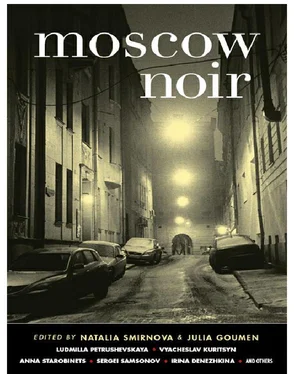A world of losers and scumbags with unblinking eyes who were trained to harass the new guy, and a world in which a merciless fate awaited them: high school, then community college, the army… then working the mines after that. Beer after work, soccer on the weekends. Or a short stint in organized crime followed by the inevitable bullet in the head. One day, out of nowhere, a boil appeared on the multiheaded body of the proletariat. An alien, with its head held high and a beaked nose: my present roommate, Tatchuk. He was insultingly different in every way. His clothes made the heavy-duty pants and jackets of those around him look like rags. His perfect, eloquent speech, the squeamish way he touched anyone else’s possessions, even the inviolable, neat part in his thick jet-black head of hair.
He had everything I lacked in excess, bravery in particular, which he used to reinforce his inner me . In fact, he was almost disgustingly devoid of cowardice. Every minute of every day he had to answer the hateful stares and the all too predictable hisses (“Freakin’ fairy!” “Faggot!”). And, indeed, he answered back, with his characteristic cool laugh and that remote smile that made you want to hit him, so full of superiority and righteousness.
He said that most people were like fish, only able to live in the waters they were made for. And if one day they decided to go deeper or higher than their stipulated habitat, they would most certainly kick the bucket. Just looking at him gave me hope that I might one day rise to a higher level of society and be able to avoid certain death at the same time. We became friends, and with that the possibility of easy ascension on the social ladder dawned on me; it was something like infatuation with an older brother who always protects and cares for you. And lo and behold! Never in my wildest dreams could I have imagined that things would turn out so well. We grew close, and he told me about how awful it was to be ordinary. He made me see that the two of us were not cut out for the wretched life of our town. And I believed him, like the ancient Argonauts believed in their specially invited guest, the favorite of the gods, whose sole purpose on the boat was to attract good luck.
It was a quiet evening at the dormitory. Suddenly, we heard cries of anger, plates crashing in the room next to ours, hysterical shrieks. We jumped up, sensing a scandal brewing. In room 620, Suskind had revolted. He lived there with Samokhin. Samokhin was always having friends over, drinking, hanging out with girls. Suskind, on the other hand, was an unsociable recluse.
“Enough, I’ve had enough of this!” Suskind shouted, his features twisted. He was screeching and squealing like a pig and smashing plates. “You bloodsucking swine! It’s always, ‘Suskind, who is this and who is that, and who the heck is Smerdyakov from Dostoevsky? Oh, that’s right, Suskind!’ And then they turn on the TV. ‘Hey, Suskind, let’s root for Lokomotiv!’ I hate goddamn soccer! Picking on me because I came from Penza, almost forty years old, to become a writer. Doesn’t take much to believe in talent that’s already been recognized. You try believing in my talent! And remember my name: Sueskin, not Suskind! Roman! Sergeevich! Sueskin!”
“Oooh! What an honor,” Samokhin enthused sarcastically, and moved to pat Suskind’s softly bearded cheek.
Suskind grabbed a knife lying on the table and shook it, wailing, “Stay back!” It was pathetic.
Fights are not a rare occurrence in our dorm. In the spring, tormented by lack of love, insignificance, and hopelessness, the bastards throw themselves out of windows. This whole place is permeated with reminders of the ever-present temptation of suicide—grates on the windows of the upper floors, metal nets stretched across the stairwell. The problem is that there are too many of us here. There are five hundred of us from every corner of this enormous country, five hundred losers, each one thinking he’s a genius. Five hundred lonely voids, living hand to mouth on miserly government scholarships sent here by our parents back home. Only a few crazy geniuses and two dozen literary hacks would make it in the world. The rest are doomed to a life of total obscurity and wretchedness.
“You don’t know the half of it, you guys,” said Samokhin, when we had come out into the hall. “At night he tries to communicate with martians, honest to god. He says they want to take him away with them. Beam me up, Scotty! He could sink a knife into me at any minute, if his aliens told him to. As Samoilov wrote, if I remember correctly, ‘This city is full of crazies, at least one in three is psycho. So speak to me softly. I might be one of them…’”
“‘Don’t be so sure that you’re so smart,’” I finished. “‘And I wouldn’t jump to conclusions about which one of us’ll come by a sharp razor first.’”
“So, Dima,” Samokhin said, addressing Tatchuk on a different topic, “do you think you’ll be the one who gets those five thousand greenbacks?”
“Who else but yours truly?”
How could he be so certain? It was as though his rich childhood imagination was furnished with its own personal universe that revolved around him alone (with a map of the stars on the ceiling and an army of teddy bears dedicated to their master). And then this perfectly polished cosmos expanded to the size of a three-room apartment, streets, schools, entire countries—and there was not one place his parent’s love, backed up by their financial means, could not reach him. The outside world seemed to fulfill even his most extravagant desires. And so my roommate, who was used to all this, seemed to be able to force reality to conform to his expectations of it. This was, I suppose, his greatest gift of all: he made the whole world into a big-budget stage production in which he, Tatchuk, was the princely heir and future ruler. All other people were his servants—faceless minor characters whose only purpose was to serve their master and then disappear from his sight forever. In this world, respiration was the only thing that couldn’t be counted on: my roommate suffered from chronic asthma, and was sometimes forced to use a fabulously expensive inhaler.
Back in our room, bare-chested, having uncorked a bottle, he surrendered happily to the nightly ritual of self-admiration. I bet nothing gave him as much pleasure as parading around the room with no shirt on. He could spend hours in front of the mirror, studying his own loving reflection in different perspectives and poses, enjoying a glimpse of his muscles, beautiful knolls beneath his satin skin. His narcissism was natural and justified, but it still got on my nerves.
“Just look at this six-pack,” he said to me, stroking his washboard belly deferentially. “Here, touch it. No, come on, touch it! Touch it!” he insisted, indignant that I should take such a criminal disinterest in his amazing abs.
I left the room as if to go out for a smoke, trying to avoid this cruel form of sexual harassment. And I came face to face with Suskind, homeless like myself.
Oh, how lucky I was to have him: my guardian angel, the great and invulnerable Tatchuk! Ever since that train on the way to Moscow, when my bag was stolen with all my money and my passport. I was devastated. I wouldn’t be able to register or sign up for classes. And then he came back (he’d left the compartment to throw out some garbage) and handed me my wallet. He had found it miraculously, in a trash can, with no money left in it, but my passport still inside. “What would you do without me?” he said. “I return you your name, your identity, and your future; don’t take it for granted.”
And so it went. Then there was the editing job at Architecture and City Planning magazine that paid three hundred dollars a month—money a provincial freshman could only dream of. The police trainees who found a crumb of hashish in the inner pocket of my canvas backpack, but who for some reason decided to let me go at the last minute for the ridiculous price of fifteen hundred rubles. The photo of us together on the first page of a glossy magazine, under the headline Our Future Is Everything . Not to mention the girls who flew toward Tatchuk like moths to a flame, and—praise the lord!—sometimes even bestowed their attentions on me. All my successes, all the publications, all the ills I managed to avoid were due to his presence at my side. It was with the greatest horror that I imagined what would happen if this deity were to turn away from me.
Читать дальше












